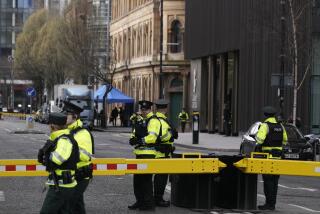IRA Ally’s U.S. Success Riles London : Northern Ireland: Gerry Adams packs two days in New York with media appearances. The British complain he wasn’t asked tough questions.
- Share via
NEW YORK — At one point before returning home on Wednesday after his brief visit to New York, Gerry Adams looked into the massed lenses of no less than 20 television cameras.
If the medium was the message, the head of the political wing of the outlawed Irish Republican Army was an omnipresent messenger. In the 48 hours his visa allowed, the bearded, professorial-looking leader of Ireland’s islandwide, legal Sinn Fein party appeared on CNN’s “Larry King Live,” cut a broad swath through the morning talk shows, showed up on “The Phil Donahue Show” in the afternoon, held several news conferences and even did a stint on public television.
Even before Adams boarded a flight out of Kennedy Airport on Wednesday night, the British government was lamenting his success and diplomats were scrambling to repair bruises on the “special relationship” between the United States and Britain.
British officials appeared taken aback by the blaze of favorable publicity attending Adams’ visit, which London had staunchly opposed and which President Clinton allowed despite advice to the contrary from his own Cabinet. Adams had been barred from the United States on eight previous occasions.
The British complained that U.S. news media seemed uninterested in hearing their side of Adams’ argument for an end to London’s rule in Northern Ireland. And they maintained that the media let Adams off lightly in interviews, rarely asking tough questions or pinning him down after evasive answers.
“There is now a member of Parliament for West Belfast who replaced, who kicked out, Gerry Adams,” British Foreign Secretary Douglas Hurd lamented from London on Wednesday on CNN. “Who is going to ask that member of Parliament into chat shows in the United States?”
Adams was elected to the British Parliament as the representative of West Belfast in June, 1983. He did not take his seat because it required pledging an oath to Queen Elizabeth II.
And speaking in the House of Commons, Hurd declared: “The test is whether Mr. Adams is now prepared at last to bring violence to a permanent end. He is a failed politician. . . . It would be quite wrong if he were given some special treatment simply because he has used the bomb and the bullet to disguise the fact that electorally he has not been successful.”
British Prime Minister John Major was said by a senior aide to regard Adams’ New York statements as “a smoke screen of evasions and falsehoods.”
“While Adams was telling the Americas he favored peace,” the aide said, “his movement was firing mortars in Northern Ireland.”
Major welcomed Clinton’s rejection of Adams’ call for U.S. intervention in the process of searching for peace in Northern Ireland, his aides said. Further, Major was reported to be thankful that Clinton decided to abandon a campaign pledge to send an American envoy to Northern Ireland to assess the 25-year-old sectarian conflict--a move opposed by the British.
Declaring that Adams produced no new ideas, Major’s aides said it was nonsense for Adams to state, as he did on his visit, that the “ball was in the British court.”
“He arrived in New York with the ball firmly at his feet,” said one. “He leaves with the ball firmly at his feet. Sinn Fein has been challenged to enter the democratic arena and has not so far had the courage to take up that challenge.”
Major and Irish Prime Minister Albert Reynolds in December produced a framework for peace negotiations in which Sinn Fein could participate, but only after the IRA laid down its arms.
The aides warned that the peace process “cannot and will not wait for Sinn Fein.”
Raymond Seitz, the U.S. ambassador to Britain, acknowledged Wednesday that the decision to admit Adams to the United States had caused a “big tussle” in the Clinton Administration.
“A lot of people argued against it and a lot of people argued for it,” Seitz told a parliamentary press lunch in London. “The President took a chance. I hope the experience in the U.S. will persuade Gerry Adams that respectability and legitimacy are nice things to have. I hope it will act as an encouragement for him to renounce violence and condemn it when it occurs. We will have to wait and see.”
But he said the Adams visa decision did not signal “a collapse of confidence across the Atlantic.”
In Washington, State Department spokesman Mike McCurry denied that Adams’ visit had damaged the “special relationship” between the two nations.
“I think the gloomy assessment that you’ve heard from some sources in the British media is not an accurate characterization of the relationship,” he said.
Goldman reported from New York, Tuohy from London.
More to Read
Sign up for Essential California
The most important California stories and recommendations in your inbox every morning.
You may occasionally receive promotional content from the Los Angeles Times.













